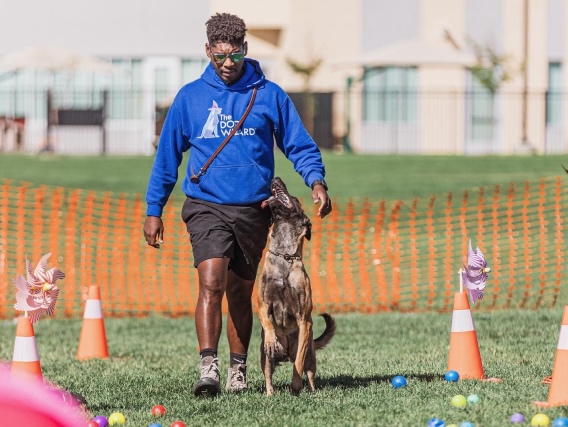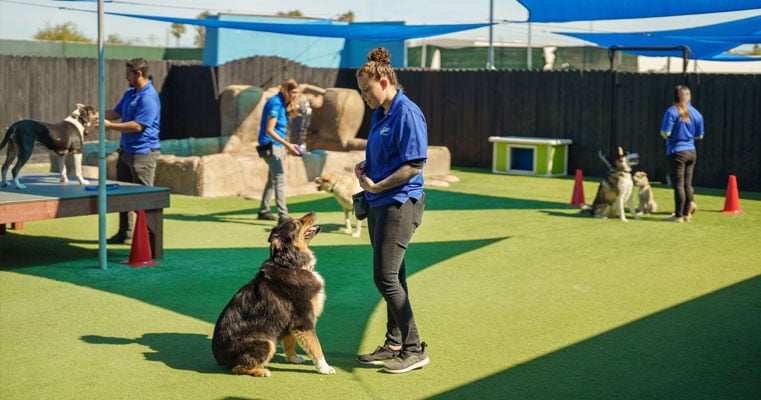Elevate Your Abilities with Local Dog Training Charlotte Programs
Wiki Article
Unlock Your Pet dog's Potential: Proven Canine Training Approaches for Success
Efficient canine training is a nuanced procedure that depends upon recognizing canine habits and employing medically backed strategies. dog training charlotte nc. By including positive support, establishing clear commands, and prioritizing socialization, canine owners can cultivate an effective connection with their pets. However, obstacles usually develop that require tailored remedies and an individual method. Discovering these verified approaches exposes not just the possibility for behavior renovation however also the deeper bond that can be created in between owner and canine. What necessary techniques must be taken into consideration to absolutely unlock your pet's potential?Recognizing Canine Habits
Understanding dog behavior is important for effective training and promoting a positive relationship in between dogs and their proprietors. An extensive understanding of canine body movement, articulations, and social interactions is critical for recognizing their demands and emotions. Pets communicate mostly with non-verbal cues; for instance, a wagging tail may suggest exhilaration, while pinned ears can signify worry or submission.
Additionally, environmental factors play a considerable duty in forming a pet's behavior. Changes in regular, new environments, or the presence of unknown people can result in tension or stress and anxiety in pets. Acknowledging these triggers enables owners to reduce adverse responses and establish appropriate training approaches.
Inevitably, a deep understanding of canine behavior lays the foundation for successful training approaches, boosting both habits and the total bond in between the pet and its owner. dog training charlotte. This expertise is crucial for fostering a well-adjusted, happy canine companion
Positive Support Strategies
Reliable training depends heavily on favorable reinforcement methods, which have been shown to generate substantial outcomes in shaping preferred habits in dogs. This approach involves rewarding a pet dog for showing particular behaviors, consequently increasing the chance that these habits will be repeated. Benefits can take various forms, consisting of deals with, praise, toys, or play, depending on what encourages the individual pet.
It is important to progressively phase out benefits as the pet learns the actions, transitioning to recurring support. This technique keeps the habits gradually while protecting against dependence on continuous benefits. By focusing on favorable reinforcement, instructors can cultivate a trusting partnership with their canines, promoting a healthy and balanced and participating training setting that enhances overall obedience and efficiency.
Developing Consistent Commands
A fundamental element of effective pet dog training is the establishment of regular commands. Consistency in commands is crucial for efficient communication between the fitness instructor and the pet. When commands are consistent, canines find out to connect details words with preferred behaviors, which increases the training process and boosts understanding.To establish regular commands, it is essential that all member of the family utilize the very same terms and gestures. If one individual makes use of "rest" while an additional states "sit down," it can create complication for the pet. Select clear, distinct words for commands and make sure everyone involved in the canine's training complies with these selections.
Furthermore, repetition is crucial. Strengthen commands through frequent practice, guaranteeing that the pet dog gets sufficient opportunities to react appropriately. When a dog efficiently adheres to a command, immediate positive support needs to comply with. This might be in the form of treats, appreciation, or play, strengthening the connection between the command and the action.
Lastly, hold your horses. Developing consistent commands takes time and effort. With commitment and clarity, you will aid your canine establish a strong understanding of expectations, eventually bring about a mannerly companion.
Socialization and Exposure
Mingling a dog is crucial for cultivating a well-adjusted and certain additional hints buddy. This process involves revealing your canine to a selection of environments, people, and various other pets to create their social skills and flexibility. Early socialization, preferably between the ages of 3 to fourteen weeks, is vital, as it lays the foundation for a canine's future habits.
During socialization, goal to provide positive experiences in different setups, such as parks, hectic streets, and homes with various other family pets. Present your dog to different stimuli, including noises, views, and scents, making sure that each experience is fulfilling. This direct exposure assists minimize fear and anxiousness, leading the means for a much more durable pet.
Involving in controlled group play sessions with various other canines can also boost service dog training social skills, teaching your pet ideal interactions and limits. Prioritizing socializing will significantly contribute to your pet's total joy and behavior throughout their life.
Conquering Common Training Challenges

Dogs might struggle to focus in unknown hand signals for dogs or busy setups. Gradually desensitize your pet to disturbances by starting training in a peaceful environment and slowly introducing even more stimulations as they become competent.
Additionally, behavioral problems like leaping or excessive barking can come to be frustrating. Address these by educating alternative behaviors, such as sitting comfortably when welcoming guests. Consistency and perseverance are important; reinforce preferred behaviors consistently and stay clear of abuse, which can cause confusion.
Finally, identify that each canine is one-of-a-kind, and training timelines might differ. Tailor your approach to your canine's specific demands, and seek professional guidance if needed. With willpower and the right techniques, conquering these difficulties can lead to a well-trained, satisfied canine companion.
Final Thought
To conclude, opening a dog's potential demands a comprehensive strategy that integrates an understanding of canine behavior, the application of positive reinforcement methods, and the facility of regular commands. Early socialization and exposure to varied environments better improve a dog's versatility and confidence. By addressing common training obstacles with customized strategies and persistence, a harmonious and participating connection between pet dog and handler can be cultivated, inevitably leading to a well-behaved buddy efficient in growing in numerous situations.Reliable pet dog training is a nuanced process that pivots on understanding canine habits and utilizing clinically backed strategies.Recognizing canine habits is vital for efficient training and cultivating a favorable relationship between pet dogs and their proprietors.Efficient training depends greatly on positive support techniques, which have actually been revealed to produce substantial outcomes in forming desired behaviors in dogs. When commands are consistent, canines discover to associate details words with preferred habits, which increases the training procedure and boosts understanding.
In final thought, unlocking a canine's possible necessitates an extensive method that integrates an understanding of canine actions, the application of positive support methods, and the establishment of regular commands.
Report this wiki page